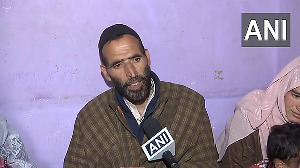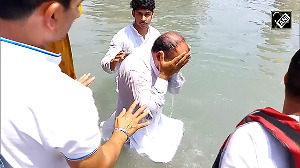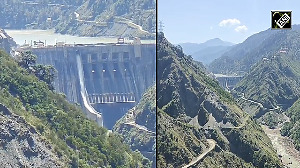The Union home ministry is expected to make some amendments in the National Counter Terrorism Centre. They will inform states about operations before undertaking them, reports Vicky Nanjappa
The Union home ministry is likely to make some amendments to the controversial National Counter Terrorism Centre in order to dispel apprehensions by state governments. The new anti-terror body may not have the right to make arrests and will have no involvement of the Intelligence Bureau.
Experts welcome this move and say that the new amendments will ensure that there is no infringement on the rights of state governments, which primarily hold the authority to govern law and order in their state. However, the bigger question is whether the new NCTC will be able to fight terror.
According to the home ministry, it deals with a host of issues -- from national security to deciding the pension of a freedom fighter. Experts say that the home ministry is already burdened with so much work and hence the ideal solution would be to create a ministry for national security instead.
Former chief of the Research and Analysis Wing C D Sahay said, “Terrorism can never be dealt with till we realise the importance of counter terrorism. The government may create various entities such as the NCTC etc, but none of this is going to work as long as we do not realise the importance of counter terrorism and state security.”
“I personally feel that a ministry for national security would go a long way in tackling this problem. The United States managed to coordinate the activities of all intelligence-gathering units under one dedicated ministry and hence I feel that the same would work for India as well,” he added.
A police official from Karnataka, a state that has been opposing the NCTC, said that the home ministry must ensure that the rights of a state are not infringed upon. “The idea of having the Intelligence Bureau to collect information, grade it and then operationalise the same under the banner of the NCTC would only cause havoc. This would have meant that the state police will have no say in arrests pertaining to terrorism. We are not a police state and in order to maintain the federal democratic structure we need to balance the parameters. It is not as though other federal democratic states have not been able to discharge their counter-terror activities.”
According to Sahay, the best way to go about this is to share the information, which is collected in New Delhi and coordinate with the state intelligence agency. “Once there is coordination, simultaneous raids could be mounted. It is not fair that the intelligence agency collects inputs, develops the same and acts on it. What if there is a rogue IB officer? He creates information, rates it as highly reliable, terms it as grade one and then hands it over to the operational team, which again is under him. What if the information is found to be bogus and motivated?”
“Nothing can be done since the IB is neither answerable to any authority nor does it have to reveal the source. In such an event, to have the IB control the NCTC would lead to havoc and hence a safeguard is essential,” added Sahay.
As per the discussions in the home ministry, there will be a lot of safeguards before the NCTC becomes operational. The IB will not be the controlling agency. The police chief of the state will be informed before any operation takes place. Once the same is finalised, another round of meetings with the chief ministers will be held and then the NCTC is likely to take final shape.







 © 2025
© 2025